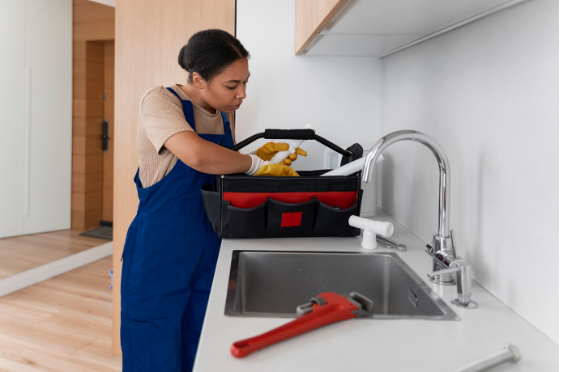When it comes to home maintenance, one of the most common challenges you may face is dealing with a blocked drain. You might find yourself wondering, “How can I unblock my drain?” In this article, we’ll provide you with five practical DIY methods to tackle a blocked drain. If these methods don’t work and you live in Australia, it’s advisable to seek the expertise of a professional plumber in Sydney to prevent further damage to your plumbing system.
Clearing a blocked drain can be achieved through various methods, depending on the severity of the clog and the type of drain you’re dealing with. Let’s walk through these techniques step by step.
1. Start with Boiling Water
Begin with the simplest method of pouring boiling water down the drain. This method is effective for dislodging minor clogs caused by grease or soap buildup. However, exercise caution if you have PVC pipes, as boiling water can damage them. Boiling water can help melt and dissolve greasy substances that may be blocking the drain. Still, be aware that PVC pipes are sensitive to high temperatures. For PVC pipes, use hot water instead, which can soften and break down clogs without causing damage.
To use boiling water for clearing a blocked drain, boil a kettle or pot of water.
Carefully pour the boiling water down the drain in a slow, steady stream. Avoid splashing boiling water on yourself or surrounding surfaces.
Pour the water in increments, allowing it a few seconds to work before adding more. Repeat the process as needed.
Keep in mind that this method is most effective for minor clogs due to greasy or soapy substances. If the clog persists, you may need to explore other methods like plunging, using a drain snake, or trying chemical drain cleaners.
2. Try a traditional Plunger
Ensure that there’s enough water in the sink or tub to cover the plunger’s cup. Position the plunger over the drain, creating a tight seal, and plunge vigorously for about 20-30 seconds. Repeat this process several times to help dislodge the blockage.
3. Use Baking Soda and Vinegar
If you prefer a natural and chemical-free solution for clearing a blocked drain, consider using a mixture of baking soda and vinegar. This age-old home remedy can be highly effective in breaking down clogs while being environmentally friendly.
Procedure:
Prepare the Mixture: Start by measuring 1/2 cup of baking soda and 1/2 cup of vinegar. You can find these common household items in your kitchen or local grocery store.
Carefully pour the baking soda down the blocked drain. Follow this by gently pouring the vinegar into the same drain. The two substances will react with one another, creating a fizzing and bubbling effect. This chemical reaction helps to break down blockages and dislodge them.
After pouring the mixture, let it sit in the drain for approximately 30 minutes to an hour. During this time, the reaction between baking soda and vinegar will continue, working to dissolve the clog.
Once the waiting period is over, flush the drain with hot water. The hot water will help carry away the disintegrated clog remnants and clear the path.
This DIY method is particularly effective for organic clogs, such as those caused by a buildup of hair, soap scum, or food particles. It’s safe for most plumbing systems and is an eco-friendly alternative to chemical drain cleaners. This however, it may not be as effective for more stubborn or solid blockages.
4. Consider Chemical Drain Cleaners (with Caution)
When all else fails, you might contemplate using a chemical drain cleaner to tackle a persistent blockage. These products are available in most hardware stores and are designed to dissolve blockages using powerful chemicals. It is crucial to exercise caution when using these cleaners, as they can be harsh on your pipes and, if not used correctly, may lead to damage or safety hazards.
Important Considerations:
When using a chemical drain cleaner, read and adhere to the manufacturer’s instructions meticulously. These instructions will outline the proper application and safety precautions.
Prior to using a chemical drain cleaner, take safety measures such as wearing gloves and eye protection. The chemicals in these products can be harmful if they encounter your skin or eyes.
Ensure that the area is well-ventilated. Chemical drain cleaners can emit strong fumes, which should be avoided for health reasons. Chemical drain cleaners are typically best suited for relatively minor clogs caused by organic matter or soap scum. They may not be as effective on solid or severe blockages.
Preventive Maintenance:
Consider using chemical drain cleaners as a last resort. Regular preventive maintenance, such as periodic cleaning of drains with natural solutions like baking soda and vinegar, can help reduce the need for these chemicals.
Plumbers have access to specialized tools designed for drain unblocking, such as drain snakes, hydro-jetting machines, and video inspection cameras. These tools enable them to efficiently tackle even the most challenging blockages, a practical advantage you may not have access to for a one-time task.
A Plumber handle the task promptly, efficiently, and with minimal disruption to your daily routine. Their expertise, specialized tools, time-saving capabilities, and assurance of preventing further damage make them the best choice for safely and effectively resolving drain clogs.









